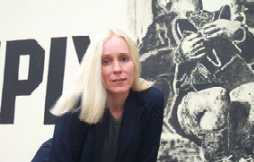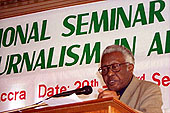|
|
 |
4 August 2001
MediaNews August 2001
Exposé on bribes in medicine wins Manyarara award
Berendien Bos
“You can trust me; I’m a doctor.” After revelations about bribes paid to doctors by pharmaceutical companies, these words no longer sound reassuring to South Africans. The series of articles on this bribery issue won Lynne Altenroxel (29) the first John Manyarara award for investigative journalism in southern Africa this May.
 |
| Lynne Altenroxel - winner Manyarara Prize 2001 |
Credibility
On 3 May 2000, South African newspaper The Star published the first of a series of articles exposing the unethical practices of doctors and the industry. Altenroxel revealed a list of nearly two hundred doctors who had taken bribes from pharmaceutical companies. | “You can trust me; I’m a doctor.” |
Her study showed that doctors had standing contracts with clinics. Medical procedures such as blood tests or X-rays generated a great deal of income for the doctors. Companies also paid for computers, office furniture and auxiliary staff.
The bribery affair turned out to be only the tip of the iceberg, resulting in an official investigation by the Medical Tribunal. The Tribunal received as many as 2500 complaints a year, but there was no concrete evidence, according to their own reports.
“Everyone suspected something,” says the reporter. “Even in the medical world, it is acknowledged, but no one wants to admit they had anything to do with it.” It was only due to “very courageous sources” that she was able to confirm the suspicions. As Ms. Altenroxel says, “As journalists, we too are more likely to believe the official sources than your average man or woman in the street.”
Using the lists Lynne Altenroxel compiled, the Tribunal hopes to be able to prove more this summer. She expects that there will be sufficient evidence to prosecute at least one private clinic and a radiology lab.
Medical insurance
The disclosures have prompted furious reactions in South Africa. Few people have health insurance, so they pay all their own bills. Only the fortunate few can afford between 125 and 225 Euros in health insurance premiums each month.
Even now, a year after the disclosures, patients approach Ms. Altenroxel with questions about their medical expenses: Are all prescribed blood tests really necessary? Did they have to be hospitalized for all those days? Despite all the publicity and the Tribunal’s investigation, the shady practices appear to be happening as frequently as ever.
Rewarding
Journalism was originally her second choice. Only after giving up her dream to become a ballet dancer did Lynne Altenroxel decide to study journalism. Despite her recent entry to the field of reporting, she has already won two awards for her work. “Investigative journalism is the hardest profession, but also the most rewarding one,” she says, referring to the responses and the impact her work can have on society.
During her career, Ms, Altenroxel has always enjoyed the support of her editor-in-chief, something that is more the exception than the rule in southern Africa. Not every newspaper can permit itself the luxury of a lawsuit, nor do they want to risk it. And there is a serious risk involved. “In general, the governments in southern Africa are very hostile towards the media,” says Basildon Peta, jury foreman and chairman of the independent association of journalists in Zimbabwe.
Intimidation
The genre of investigative journalism has hardly been developed in the region. With the exception of reporters like Carlos Cardoso, who was murdered last year in Mozambique, many journalists consider it too great a risk to keep asking questions, to turn over that final stone.
As Mr. Peta says, “Journalists work under very difficult circumstances. The people in power often intimidate and terrorize the reporters. If you live in constant fear, it affects your attitude towards your work.”
South Africa is still one of the positive examples for the region. According to Lynne Altenroxel, the intimidation that takes place is more subtle, but often no less effective.
South Africa appears to be ruled by political correctness, and its impact can be seen even among her colleagues. Some reporters keep track of whether they quote an equal number of male and female members of parliament. Accusations of racism or the increasingly fashionable ‘unpatriotic behaviour’ fly fast and free.
Last year, a (non-white) colleague of Ms. Altenroxel’s was accused of white racism. Her critics felt that she allowed her opinions “to be dominated too much by her white superiors.” Ms. Altenroxel explains, “Nearly every political party uses the race issue for their own ends. Black and white will control every discussion in South Africa for a long time yet.”
Difference
The media and President Mbeki’s government often find themselves at odds. The investigation into racism in the media, the critical commentaries on Mbeki’s position in the HIV/AIDS debate, and the recent statements by Minister Pahad have not helped the relationship between the government and some of the South African journalists.
“I believe that there is a clear difference between Mbeki’s behaviour and that of his predecessor Mandela. Naturally the president has the right to criticize the media, but sometimes he responds too hysterically.”
During the interview, she regularly sighs that things were not that black-and-white. However, she feels she may be too pessimistic: “South Africa has great media laws. Our new law about access to information is very progressive. The government isn’t out to shut us up.” Journalists are not attacked physically, but at the same time, she says, the state tries to force journalists to h and over evidence. She is referring to photographer Benny Gool, who was present at the murder of gang leader Rashaad Staggie.
Altenroxel: “They don’t even think about the consequences for the others present if his photographic material is released. We have to be vigilant and resist such subtle forms of intimidation.”
 |
| John Manyarara |
The Manyarara Award for Investigative Journalism is presented annually. The winner receives 2000 Euro and a study grant of 10,000 Euro, sponsored by PSO. The award is an initiative of the Media Institute of Southern Africa and the NiZA. It is a tribute to Justice Manyarara. As a radio journalist and judge on the Supreme Court of Zimbabwe, he was a passionate advocate of freedom of speech in Zimbabwe. Since his retirement, he continues to work to improve the freedom of the press in his country.
| |
|
|

|
 |  |  |  |
|

